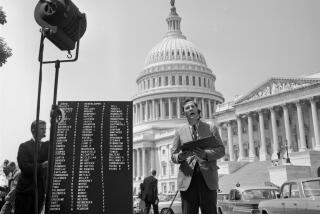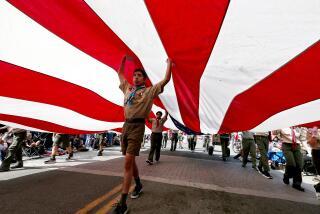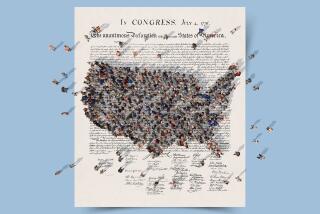The Poor, the Isolated Taste No Fruits of a Proud Fourth
- Share via
CONCORD, Mass. — A mile from where I am writing, a few farmers presented us with an armed revolution against British rule. More than a century later New York, collaborating with France, gave us a statue to celebrate our initial independence and the ingathering of the nation that was to remold democracy. This week, as a symbol of our continental completion, Hollywood is to provide--from 3,000 miles away--fireworks displays, laser beams and saturation television: an exultant, star-spangled extravaganza in the guise of commemoration.
Like most Americans, I expect to be dazzled, moved and stirred to pride by the celebration.
I have special reasons for gratitude. In many, perhaps most, other countries my habit of regularly condemning the sins and the hypocrisies of the powerful would be forbidden or severely punished. And even if one of the reasons I am not disturbed is that America does not think words and ideas serious enough to merit official attention, still I recognize it is liberty more than indifference that keeps me free and mildly prosperous.
America is not just a place, but an idea--one different from the idea of other nations. The American wilderness had sheltered no Roman legions, no Renaissance or Elizabethan Age. For us the foundations of nationhood--population and territory--were always changing. We were the land of opportunity yet to come. We were William Bradford’s “city on a hill,” Jefferson’s “chosen country,” Lincoln’s “favorite land,” and from there, in a direct line, to Wilson’s 14 Points and Roosevelt’s Four Freedoms. This idea differed from that of other nations in a crucial quality: It had to be constantly renewed. It could not be sustained by saying we had been a land of opportunity, or that once we had a great purpose. Our celebrations of the past have always implied a critique of the present and a guide to the future. “Americans are always moving on.”
In that tradition this Fourth of July should cause us to reflect how far we remain from the ideal of freedom--that way of life which was the dream of those who participated in that first Fourth of July almost two centuries ago.
In the Constitutional Convention of 1787, Charles Pinckney of South Carolina said that the new nation would “open to the frugal and industrious a sure road to competency and independence.” He shared with many of his fellow delegates the belief that the entire body of citizens had the right to share in material abundance, and from this necessary base could embark on the “pursuit of happiness.”
From this premise we can derive a definition of freedom as meaningful for our time as it was in those dawn days of the Republic: Freedom is the use and fulfillment of our humanity--its powers and wants--to the outer limits fixed by the material capacity of the time.
People who are compelled to struggle for food and decent shelter and warmth, who are invisibly walled in neighborhoods that foredoom their children to ignorance, or drug addiction, or random violence, are not free. Their humanity, the talents and ambitions, the love and hope, which are the heartbeat of a free existence, are denied at birth or strangled in the streets of childhood.
In an impoverished Third World country such a fate may be unavoidable. But American society has the capacity--the resources, technology and knowledge--to provide every citizen with the necessities of a tolerable existence. Failure to do so is a denial of freedom. And those millions who are the victims of this failure may be citizens of a free country, but they are not free.
Our inability, our unwillingness, to extend the bounty of America to the deprived--though easily done--diminishes the freedom of all of us. It signals a gradual dissolution of the connections with our fellow citizens, which go by the names of “family,” “neighborhood,” “community,” “faith” and “country.” That disintegration--the most important phenomenon of modern social life--removes from reach the many aspects of human fulfillment that can only be attained in the company of others and turns us to the solitary accumulation of material possessions, a kind of addiction through which we attempt to obliterate the painfully reduced possibilities of an isolated existence.
The possibilities crippled by those diminished ties are another name for a loss of freedom.
The poor and the isolate, both denied the fruits of the Fourth of July.
Jefferson foresaw the danger when he exhorted, “Let us restore to social intercourse that harmony and affection without which liberty and even life itself are but dreary things.”
The absence of that “harmony and affection” is the buried watercourse from which springs our own distress and our tolerance of the greater distress of others. It is the enemy of freedom. Jefferson was a practical man, not accustomed to asking the impossible. That may mean that affection and caring for our fellows is still a possibility. Or, more darkly, it may prove the wisdom of the protagonist in Saul Bellow’s “Mr. Sammler’s Planet,” who relates, “Tolstoy says you don’t kill another human being with whom you have exchanged (a human) look . . . I sympathize deeply. I sympathize sadly. When men of genius think about humankind, they are almost forced to believe in this form of psychic unity. I wish it were so.”
Have a wonderful Fourth!
More to Read
Get the L.A. Times Politics newsletter
Deeply reported insights into legislation, politics and policy from Sacramento, Washington and beyond. In your inbox twice per week.
You may occasionally receive promotional content from the Los Angeles Times.









